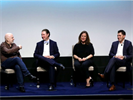Aarti Shah 30 Jul 2013 // 7:30PM GMT
The joining of Omnicom and Publicis to form the world’s largest holding company of marketing services has been positioned as Madison Avenue’s answer to Silicon Valley’s dominance in online media buys.
Whether that intention results in a power shift remains to be seen. But already, competitors -- including Havas CEO David Jones and Edelman PR CEO Richard Edelman -- have publicly doubted the move with Edelman likening the deal to the ill-fated Time Warner-AOL marriage.
Among the many questions raised in the wake of the deal is how the mega merger will ultimately impact the PR agencies on both sides: Omnicom’s largest PR firms Ketchum, FleishmanHillard and Porter Novelli and Publicis’ anchor PR brand MSL Group.
After all, the new company will create the largest holding of PR businesses in the world with a combined fee income surpassing $1.8 billion, overtaking former leader WPP. But PR is still a small piece of the pie, considering the new entity’s overall combined revenue tops $22 billion, mostly from paid media offerings. According to Omnicom’s Q2 2013 earnings, advertising makes up nearly 50% of overall revenues.
“PR is not the center at either of those companies,” says a rival global network head. “This is a fight over media, PR is an afterthought.”
The most immediate concern for the PR agencies involved, the source said, should be figuring out how to retain talent and ensuring the innovation pipeline keeps flowing.
“For the clients, if their teams don’t change -- it’s not a big deal,” the source said. “But are people going to leave because of confusion? Because there’s not enough money? Will they start their own firms because they know they have a lock on their clients’ business?”
With the merger promising $500 million in efficiencies, scarcer resources is certainly a possibility. Yet in the joint press statement, Omnicom CEO John Wren made it a point to say “Both [Publicis Group CEO Maurice Lévy] and I believe this new company reflects our vision of retaining the best talent, attracting an incredible roster of clients and leading innovation.”
Rob Flaherty, CEO of Ketchum, maintains that PR “won’t get lost in the mix because clients need all of these parts.” The deal’s benefits of scale apply directly to using big data to glean consumer insights and lowering costs for content amplification -- two areas that PR has a play in.
“It’s very exciting with media buying moving into shared, owned and earned -- this enables us to work more closely with Facebook and Google,” Flaherty adds.
On his blog, independent rival Edelman -- who runs a $700 million global PR business -- predicts the smaller PR firms within the either holding company should expect to be merged as “PR will not be a focus area; it will be part of the supporting cast.”
But Omnicom has been battling rumors of brand consolidation since Porter Novelli fell on troubled times in the mid-2000s -- and the holding company has yet to make such a move on the front-end. In fact, after bouts of substantial upheaval both Porter and Publicis’ MSL seem to be on an upswing. But what remains in question is whether the MSL Group will roll into Omnicom’s DAS division that houses its PR agencies.
“It is too early to tell precisely how the new holding company will be structured," Trudi Harris, MSL Group’s CCO told the Holmes Report.
Also, will the PR impact be noticeable enough to cause a ripple effect across the industry?
“I think there will be a second level effect of other holding companies trying to bulk up, so mid-sized PR firms will get acquired,” Edelman said. With digital buckled into the driver seat, he suspects the group’s PR firms will increasingly get shooed away on meaty digital briefs and instead get tossed community management assignments.
Publicis’ CEO Lévy, however, hasn’t left communications out of the conversation. In a press statement, he acknowledges “The communication and marketing landscape has undergone dramatic changes in recent years...[Omnicom CEO Wren] and I have conceived this merger to benefit our clients by bringing together the most comprehensive offering of analog and digital services.”
More directly, FleishmanHillard CEO Dave Senay says the merger won’t change his firm’s trajectory towards integrated solutions. “We refuse to be constrained by the definitions of the old world. We look to the future with great optimism, therefore."
Tim Dyson, CEO of UK-based digital communications holding company Next15, calls the Omnicom-Publicis merger “a victory for digital marketing in the sense that it proves that the big agencies are really struggling with cannibalization.”
Dyson maintains for smaller shops like his -- which include Text100, Bite and M Booth -- the merger doesn’t ultimately change competitive dynamics. Next15 takes in about $149 million annually in PR revenues.
“Smaller firms will always struggle to compete with big agencies if all the client wants is a big agency,” he adds, downplaying the increased clout the new holding company will have to negotiate ad buys. “It’ll be a fraction of a cent.”
He predicts immediate PR consolidation of the larger PR firms is unlikely, given the various complications arising from integration, including dealing with potential conflicts. Already, much has been made of the revelation that Omnicom works with Pepsi and Publicis with Coca-Cola.
“Everybody will be watching the client base of these two companies and see how they react,” Dyson adds. “Clients will not see the advantage of this for a long time, they will be nervous about their teams and the people are going to be nervous -- it’s not an environment where people do their best work. It creates an opportunity.”
Yet both Omnicom and Publicis have, so far, demonstrated they are aware of the potential trappings of the deal -- including the importance of retaining talent -- and that bigger for its own sake isn’t the end goal, adapting to market conditions is. In an internal memo seen by the Holmes Report, Lévy and Wren point out, “We have seen the rapid development of new media giants, the blurring of the roles among media player, and the fundamental change in consumer behavior as people adopt new technologies.”
Fleishman’s Senay told the Holmes Report, “To adapt an old adage, 'No one can make you feel like an afterthought without first having your permission.' We have never felt like an afterthought within Omnicom, which has treated FH very well.”
And for now, the market modestly rallied in response to the news with shares of Omnicom and Publicis making gains, as well as its rivals Interpublic Group and WPP.


































.jpg)

















